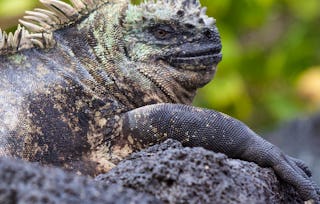Introduction to Genetics and Evolution is a college-level class being offered simultaneously to new students at Duke University. The course gives interested people a very basic overview of some principles behind these very fundamental areas of biology. We often hear about new "genome sequences," commercial kits that can tell you about your ancestry (including pre-human) from your DNA or disease predispositions, debates about the truth of evolution, why animals behave the way they do, and how people found "genetic evidence for natural selection." This course provides the basic biology you need to understand all of these issues better, tries to clarify some misconceptions, and tries to prepare students for future, more advanced coursework in Biology (and especially evolutionary genetics). No prior coursework is assumed.

Introduction to Genetics and Evolution

Introduction to Genetics and Evolution

Instructor: Dr. Mohamed Noor
185,418 already enrolled
Included with
1,874 reviews
Skills you'll gain
Details to know

Add to your LinkedIn profile
18 assignments
See how employees at top companies are mastering in-demand skills

There are 12 modules in this course
General introduction to this MOOC, including coverage and expectations.
What's included
3 readings
This module discusses the definition of the word "evolution" in a biological context, evidence for the truth of evolution and common ancestry of species, and public thoughts and misconceptions about biological evolution. This module is optional and will not be included in the course assessments. There are not class discussion forums for this section, as we feel such discussion can happen on other, non-course-related, sites on this topic (of which there are a great many on the internet).
What's included
5 videos1 reading
An introduction to basic transmission genetics and inheritance. This module reflects what is often covered in high school biology courses in the USA.
What's included
6 videos1 reading2 assignments
This module delves somewhat more deeply into genetics and specifically the concept of "recombination." It begins to discuss how recombination is leveraged in classic genetic works as well as mapping simple genetic traits using crosses or data from natural populations.
What's included
7 videos1 reading2 assignments
This module delves even more deeply into the complexities of the genetics underlying traits,the origin of genetic variation, and how "complex" traits (ones controlled by multiple genes) are studied genetically.
What's included
6 videos1 reading2 assignments
This module begins the transition to evolutionary genetics by looking at the relative contributions of genetics and environment to traits, and also introduces how population growth is studied.
What's included
6 videos1 reading2 assignments
Rather than looking at individuals, this module discusses how multiple individuals from natural populations can be studied genetically to begin to understand the evolutionary forces acting upon the populations.
What's included
6 videos1 reading2 assignments
This module extends the previous one to specifically examine the effects of natural selection and genetic drift on genetic variation in natural populations.
What's included
7 videos1 reading2 assignments
This advanced module explains why sexual reproduction (involving recombination) is evolutionarily advantageous, and discusses how the analysis of DNA sequences can be used to understand the evolutionary forces acting on populations or species, either in general or at specific genes.
What's included
7 videos1 reading2 assignments
This module changes gears a bit to look at the exciting field of animal behavior-- specifically, how particular behaviors are or may be adaptive, and why individuals choose particular others as mates.
What's included
5 videos1 reading2 assignments
This module gets into the nitty gritty of what causes the formation of new species, and how evolutionary relationships between species are inferred.
What's included
6 videos1 reading2 assignments
This final module talks about applications and misapplications of many of the concepts discussed in the course to human health, understanding, and well-being. This module is optional and not included in the assessments.
What's included
2 videos2 readings
Instructor

Offered by
Explore more from Basic Science
 Status: Free Trial
Status: Free TrialRice University
 Status: Preview
Status: PreviewAmerican Museum of Natural History
 Status: Preview
Status: PreviewAmerican Museum of Natural History
 Status: Free Trial
Status: Free TrialRice University
Why people choose Coursera for their career

Felipe M.

Jennifer J.

Larry W.

Chaitanya A.
Learner reviews
- 5 stars
84.64%
- 4 stars
11.62%
- 3 stars
1.86%
- 2 stars
0.74%
- 1 star
1.12%
Showing 3 of 1874
Reviewed on Sep 20, 2020
A wide-ranging introduction that will make you want to read and learn more. The assessments are doable but challenging. The instructor is a widely-published expert in the field and a delight.
Reviewed on Sep 27, 2017
Very good course that prepared me for Genetics at Pima Community College in Tucson. I am able to follow the lectures and actually understand what is being presented. I am glad I took this course.
Reviewed on Jan 7, 2016
Excellent course. Would recommend it to anyone who wants to delve in the subject matter. Wonderful instructor and interesting lecture videos. One of the best courses I have taken in Coursera.

Open new doors with Coursera Plus
Unlimited access to 10,000+ world-class courses, hands-on projects, and job-ready certificate programs - all included in your subscription
Advance your career with an online degree
Earn a degree from world-class universities - 100% online
Join over 3,400 global companies that choose Coursera for Business
Upskill your employees to excel in the digital economy
Frequently asked questions
No. Completion of a Coursera course does not earn you academic credit from Duke; therefore, Duke is not able to provide you with a university transcript. However, your electronic Certificate will be added to your Accomplishments page - from there, you can print your Certificate or add it to your LinkedIn profile.
To access the course materials, assignments and to earn a Certificate, you will need to purchase the Certificate experience when you enroll in a course. You can try a Free Trial instead, or apply for Financial Aid. The course may offer 'Full Course, No Certificate' instead. This option lets you see all course materials, submit required assessments, and get a final grade. This also means that you will not be able to purchase a Certificate experience.
When you purchase a Certificate you get access to all course materials, including graded assignments. Upon completing the course, your electronic Certificate will be added to your Accomplishments page - from there, you can print your Certificate or add it to your LinkedIn profile.
More questions
Financial aid available,

